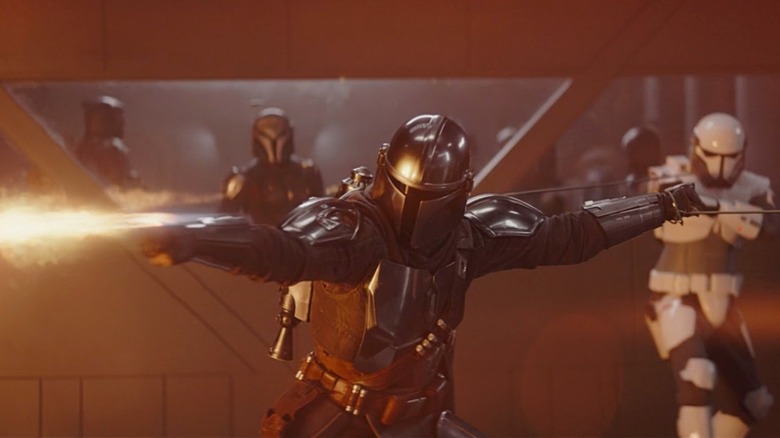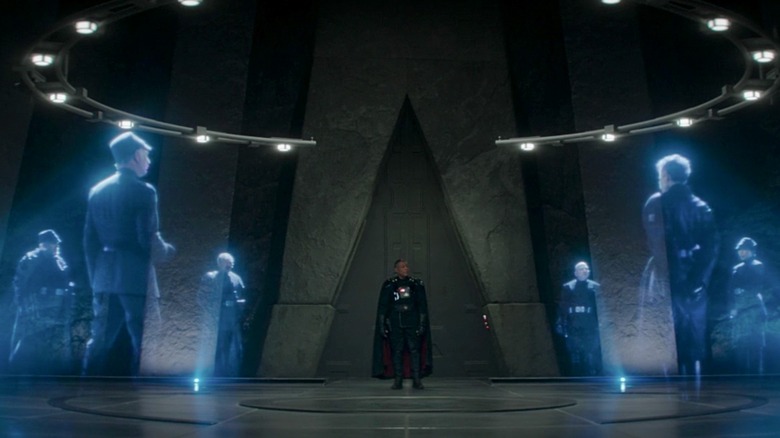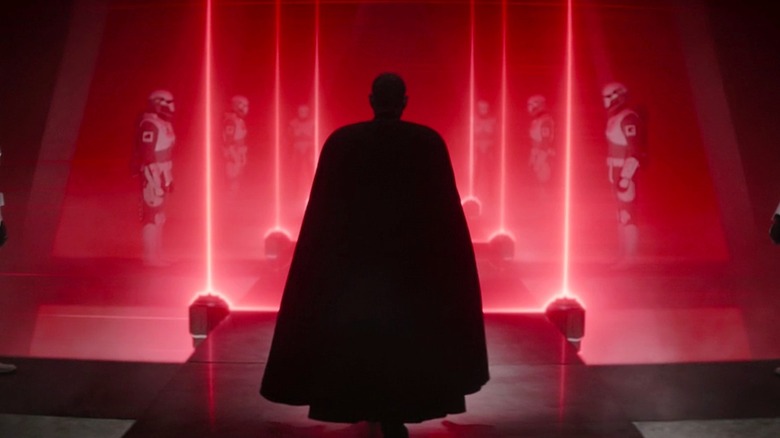The Mandalorian Season 3 Is Exploring An Important Gap In Star Wars History
This article contains spoilers for the latest episode of "The Mandalorian."
When season 1 of "The Mandalorian" was first revealed to take place in the interim years between the original trilogy and the sequel trilogy, it felt like a choice that was all but predestined. After all, it wouldn't have made much sense for the shiny new streaming series to outpace the timeline of the saga films, nor would it have been advisable to rob themselves of the narrative (and crossover) potential of roping it several established characters from various corners of the "Star Wars" galaxy. Now, however, season 3 appears set on proving just how smart it was to dive deep into a largely unexplored period of time in the franchise's canon.
Season 3, episode 7, entitled "Chapter 23: The Spies" (you can check out /Film's review by Bryan Young here), provides the show's most emphatic statement yet that there's plenty of gaps to fill in-between the two trilogies. Din Djarin's (Pedro Pascal) initial bounty hunter ambitions now seem infinitesimally small compared to the plight of the Mandalorians, their plans to reclaim their home world, and the dastardly Moff Gideon's (Giancarlo Esposito) efforts to thwart these enemies of the fallen Empire at all costs.
It's that last point, however, that stands out the most in this latest chapter of "The Mandalorian." The hour quickly catches us up to speed on the newly-freed Gideon during a tense meeting of the Shadow Council, rounding up the figureheads of the Imperial remnant as they scheme to restore the Empire in direct opposition to the New Republic. Why is this so significant? Well, the Shadow Council represents yet another link in the chain connecting the so-called "Mandoverse" to the overall "Star Wars" universe. The implications, excitingly enough, are as far-reaching as it gets.
What is the Shadow Council?
Who knew that attempting to revive the Imperial war machine from the ashes of defeat would be no easy feat? Such an endeavor requires meticulous strategizing, some classic political back-stabbing, and maybe even a plan involving a little bit of necromancy. Standard Empire business, in other words!
In order to pull off such an ambitious scheme, the leftover Imperial remnants somehow need to coordinate their efforts. Enter the Shadow Council, which finally made its live-action debut in the latest episode of "The Mandalorian." First introduced in author Chuck Wendig's novel "Aftermath: Life Debt" in 2016, the top-secret board is revealed to be the brainchild of Fleet Admiral Gallius Rax in the immediate aftermath of the Death Star 2.0's destruction in "Return of the Jedi." Rax, touted as the Counselor to the Empire and a protégé of the Emperor himself, is also a main character from the "Aftermath" trilogy of novels and plays an outsized role in guiding the transition from the Empire to the First Order.
Created with the express purpose of reviving the now-fragmented Empire in the wake of the Emperor and Darth Vader's untimely demises, the Council counted on the unwavering support of Brendol Hux, the father of General Armitage Hux from the sequel trilogy, whom we see verbally sparring with Gideon during their session (and yes, the family connection is further strengthened as Brendol is portrayed by Brian Gleeson, the brother of original Hux actor Domhnall Gleeson) and Captain Gilad Pellaeon (Xander Berkeley), a key proponent of paving the way for Grand Admiral Thrawn's return. Although viewers will (likely) have to wait for "Ahsoka" to see Lars Mikkelsen suit up as the fan-favorite big bad, it's clear that "The Mandalorian" season 3 has major plans for its final episode.
Connecting the dots
If there was ever one justified criticism of "The Mandalorian" throughout its first two seasons, it was the fact that the series hardly deigned to acknowledge the tumultuous state of the galaxy at this specific moment in franchise canon. Beyond occasional run-ins with pesky New Republic traffic cops Ranger pilots or wayward Imperial TIE Fighters, creator Jon Favreau and producer Dave Filoni have remained content to leave the brewing war between the New Republic and the Imperial remnants far off in the background.
That, however, has finally changed throughout season 3. Not only has Din Djarin's initial pilgrimage to Mandalore led to a much larger conflict of retaking the Mandalorians' home world for good, but the reappearance of Gideon now adds even more connective tissue to the Empire's goal of reemerging as a galaxy-wide threat once again. By retrofitting Gideon into a main player on the Shadow Council, who scoffs at the very notion of Thrawn's return and instead takes the practical approach of swaying the members to support his war against the Mandalorians, "The Mandalorian" deftly brings the series full-circle. Gideon was the original antagonist from the very first season — back when the show's scope and scale felt much more intimate — and adds an extra oomph to its world-building as the series continues to tie together wildly different eras of "Star Wars" history.
With only one more episode to go this season, the series' creative team will be hard-pressed to wrap up every loose thread and possibly set up the future spin-offs to come. But one thing's for sure: unveiling the Shadow Council was not a decision made lightly. Expect this to factor into future installments of the Mandoverse in the years ahead.
The newest episode of "The Mandalorian" is now streaming on Disney+.


